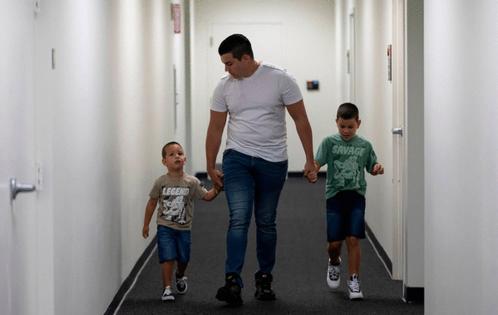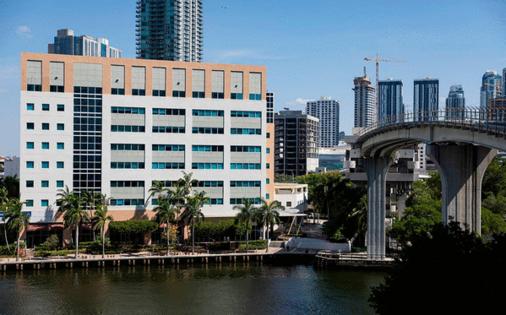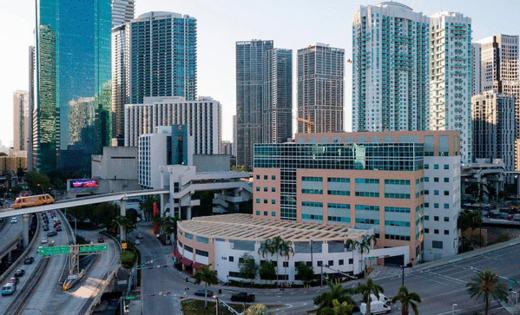Where fates are decided: Miami's immigration courts are microcosm of South Florida
Published in News & Features
MIAMI -- Suset swung her legs from side to side on the bench in a Miami immigration courtroom. Her feet had carried the seven-year-old girl from Cuba to the U.S.-Mexico border. But on that recent afternoon they did not even graze the floor.
She tugged on the sparkly sleeves of her black dress as she inched towards the table near the the screen where Judge Irene Recio presided over the courtroom virtually. The government’s lawyer and a Spanish-language interpreter also attended over webcam. Suset sat down with her mother and nine-year-old brother and waited for their first immigration hearing to begin.
“Thank you for giving me the opportunity to meet you. But now that I’ve met you, you don’t have to come back, because I’d rather you go to school,” the judge said, waiving the presence of the two siblings at future proceedings.
Without missing a beat, Suset replied in a singsong voice: “Nah.”
Quiet laughs bubbled up from the audience, filled with Nicaraguan and Jamaican asylum seekers, Haitian migrants and other families from Cuba — a microcosm of South Florida’s immigrant communities.
Miam-Dade’s immigration court, at 333 S. Miami Ave, is located where the riverfront meets Biscayne Bay in Downtown Miami. Anyone driving by could easily miss it. Skyscrapers and residential towers dwarf its presence. But for the hopeful thousands of immigrants who visit its austere, hushed courtrooms, it’s one of the most critical places they will ever go, where their fates in the United States are decided.
Years’ long appointments
One of the reasons Suset’s family left Cuba was to seek medical treatment for the little girl, who was born without her left hand. Susana Perez, her mother, described her as a gleeful child who “is the life of family parties” and doesn’t let obstacles intimidate her. At immigration court, she had wanted to wear heels, a fashion statement her mother did not allow her to make.
Despite her daughter’s upbeat attitude, Perez said the legal process has been challenging. The family, like so many, is navigating complex immigration law in a foreign language, in a new country, and without legal representation. And the possibility of deportation at the end of the road is daunting.
“The worst fear I have is that. Not only because of me, but for my children,” said Perez, 40.
The Cuban family, along with many others in court on a recent Monday, had their next hearings scheduled for sometime this winter. But it’s not uncommon for migrants to get their next appointment scheduled years later in Miami’s immigration court, which has the biggest backlog of cases in the country.
The Miami Herald witnessed cases being scheduled as far in advance as 2027 over the course of several visits to the South Florida court. An analysis of Department of Homeland Security data from researchers at Syracuse University shows that there were over 320,000 pending immigration cases here as of July 2024, the largest backlog in any single court. The court currently has 28 judges assigned to the facility.
Outside the courtroom that day, the waiting room hummed in Spanish, English and Creole. Spouses, parents and siblings of migrants awaiting proceedings passed the time while their loved ones wrapped up their hearings. A Venezuelan man burrowed his head into his hands. Another held his 8-month-old son against his chest. Two women watched videos on one phone while a Cuban family dressed in white came in, stroller in tow.
For newcomers and their loved ones, the years-long wait times for their immigration cases to be heard and resolved causes chronic anxiety and an inability to put down roots. Migrants, unable to visit family while they are in these legal processes, are separated from relatives for long periods. Sometimes, they might become ineligible for immigration benefits or lose documents, photos or videos that could help them prove their asylum cases.
“This backlog creates a really prolonged uncertainty and hardship for people who are waiting for their day in court,” said Catherine Walker, the supervising attorney for the detention program at Miami-based Americans for Immigrant Justice, which offers legal counsel to immigrants.
Millions of new cases
Immigration judges nationally completed over a million cases in 2023, far outpacing previous years, according to data from the Justice Department. The executive Office of Immigration Review, the Justice agency that oversees immigration courts, also hired a record number of judges that same year. But the system has not been able to keep up with the increased immigration to the U.S. in recent years.
In fiscal year 2024 alone, the Department of Homeland Security filed over a million and a half “notices to appear,” the document that officially kicks off immigration proceedings. In all, the nationwide backlog stood at around 3.7 million cases as of July 2024.
An agency spokesperson said that “reducing the immigration court backlog is the highest priority” and that it “continues to take all available steps” to bring it down. Despite the monumental increase in cases, Congress slashed the immigration court system’s budget by $16 million for fiscal year 2024.
“Judges are not going to be able to process their way out of this. The government needs to think of a different solution to provide stability and relief outside of the immigration court system,” said Adriel Orozco, senior policy counsel at the American Immigration Council, a Washington D.C.-based think tank.
“I have no idea”
In Miami’s immigration court, the Department of Homeland Security has filed more than 226,000 cases in the last two years. Many of the people who have come in large numbers through the U.S.-Mexico border in recent years — including Cubans, Haitians, and Venezuelans — gravitate towards South Florida. In Miami’s court, those three nationalities made up over half of all people with pending cases, followed by Nicaraguans.
South Florida’s demographics mean that certain policies have an outsized effect in the region’s federal immigration system. Some Haitians and Venezuelans have been able to get their court cases closed because they now qualify for Temporary Protected Status after the Biden administration expanded the program forl hundreds of thousands of migrants from those two countries. Meanwhile, other policy shifts have brought more people into the system. Thousands of Cubans who would have received green cards in another time of U.S. history are now receiving paperwork at the border that makes them ineligible for permanent residency under the Cuban Adjustment Act because of a court decision.
On one Monday morning, many migrants awaiting audiences were Cubans who had been given that paperwork. Among them was Eileen Cubillas, a 40-year-old from the central province of Mayabeque.
She asked Judge Recio why she had received that paperwork, while her husband had gotten a parole that allowed him to apply for a green card a year and a day after entering the U.S. under the Cuban Adjustment Act.
“It has been quite a cumbersome process,” Cubillas said of the immigration system shortly after leaving the courtroom.
No right to representation
During hearings in Miami’s immigration court, judges directed migrants to organizations that could offer them legal counsel and explained their rights and responsibilities. They also warned of so-called “notario” fraud, a common phenomenon in South Florida where notaries charge exorbitant fees for immigration counsel that they are not legally allowed to provide. Many immigrants who first arrive in the U.S. go to them for help with their case since in many places in Latin America, notaries are often practicing lawyers.
“If you want to keep throwing away your money it’s better to throw it away than give it to the notario. You have to stop going to the notario because they cannot help you,” Judge Lourdes A. Rodriguez de Jongh told one Cuban migrant during a hearing.
People in immigration proceedings are not entitled to legal representation. Only 21% of immigrants in Florida immigration courts have representation, despite research showing that immigrants with lawyers are five times more likely to win their cases.
“Unfortunately so many people are forced to navigate the complex immigration system without attorneys and they are going up against highly trained government lawyers without anyone to explain their rights or defend them in court.” said Catherine Walker, the Americans for Immigrants Justice attorney.
Immigrants in court told the Herald that even though they appreciated judges giving them extra time to find lawyers, it was unlikely they would be able to do so. The organizations that provide low-cost or free legal services are strained for resources and cannot meet the demand. And paying for housing, food, and other basic necessities takes up most of the immigrant families’ money.
“Getting a lawyer is expensive and so is preparing the case,” said Lorena Barban, 26, from the historic city of Santiago de Cuba.
Deported in absentia
On that Monday afternoon, Barban had her first court hearing, nearly two years after arriving in the U.S. She came with Lisandra Isadron, a 25-year-old accounting student from the island she met at the U.S.-Mexico border. The pair became fast friends, and they kept in touch even as Barban moved to Miami and Isadron went up to West Palm Beach to reunite with her fiance.
Both women sank into the bench at the back of the immigration court, clutching their pregnant bellies. Together, they are facing first-time motherhood and the immigration court system in a new country.
“We could feel the children shaking and kicking the whole time,” Barban said shortly after leaving the courtroom.
Isadron is due in November, while Barban is expected to give birth in late December. Both hope they can provide their kids with bright American futures.
The hearings of the day concluded with a Jamaican asylum seeker, who whispered while waiting on a bench that he loved this country so much that he wanted to stay here forever. The court clerk called out for someone who had not shown up to a scheduled hearing. Judge Recio ordered that individual deported to Colombia.
The courtroom emptied out for the afternoon until the following morning, when dozens of hopeful newcomers would once more stand before the immigration courts of South Florida, hoping for their chance to stay.
©2024 Miami Herald. Visit at miamiherald.com. Distributed by Tribune Content Agency, LLC.












Comments